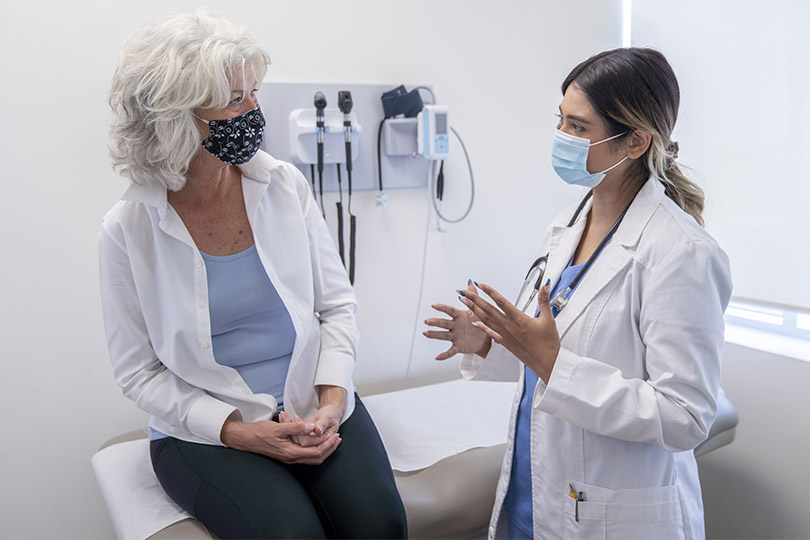Genetic Counseling Patient Resources & Assessments
Appointments
General Genetics Information
Genes are units of inheritance that code for traits and conditions, such as eye color or hair texture. Genes are located on structures called chromosomes. Individuals typically have 46 chromosomes that come in 23 pairs. One copy of each chromosome pair (and therefore each gene) comes from our mother and the other from our father. Similarly, we pass on one copy of each chromosome pair to our children.
Genes make proteins that are necessary for the proper growth and development of the body. Each gene is made up of an informational code called DNA. If you think of a gene as a very large book, DNA is the alphabet that makes up the words and sentences in the book. When a gene is altered, it simply means there is a typographical error (typo) in the book. This alteration (or “mutation”) makes the gene unable to function properly. Alterations can be as large as an entire chapter missing from the book, or as small as a single letter change within a word.
Alterations in certain genes (called cancer predisposition genes) may increase an individual’s chance to develop specific types of cancer. Please review the following disease-specific information sheets for details about some of the more common hereditary cancer predisposition syndromes.
Many individuals and families who see genetics providers have concerns about the privacy and confidentiality of their information and how genetic information might be used by third parties (insurance companies, employers, etc.). There is public concern about the possibility that a health insurance company or employer could use the results of a genetic test to discriminate against an individual. There are laws that exist to protect against genetic discrimination in the realms of health insurance and employment.
There are websites that have additional information about genetic discrimination:
Find a list of online risk calculators below to estimate personal risk of certain cancers.
Breast Cancer Prevention – US National Surgical Adjuvant Breast and Bowel Project:
Estimates a woman’s breast cancer risk over the next five years and up to the age of 80 for women 35 to 84 years of age.
Harvard School of Public Health Disease Risk Index:
Estimates your risk of developing cancer, diabetes, heart disease, osteoporosis, and stroke.
NCI’s Breast Cancer Risk Assessment Tool:
Estimates a woman’s risk of developing invasive breast cancer.
NCI’s Colorectal Cancer Risk Assessment Tool:
Estimates an individual’s risk to develop colorectal cancer.
NCI’s Melanoma Risk Assessment Tool:
Estimates an individual’s risk to develop melanoma.
It is often helpful to gather detailed information about your family history of cancer before your initial genetic counseling appointment. Please complete our Cancer Risk Evaluation Packet and bring it with you to your appointment. Please document the specific cancer diagnosis as accurately as possible, including the individual's age at the time of the diagnosis. For families with a history of colon cancer and polyps, it is helpful to know who in the family has had a colonoscopy and whether or not polyps were identified. For individuals with polyps, the genetic counselor will want to know the number of polyps and the type of polyp, if possible. Some families are able to obtain a lot of information about their relatives, but sometimes detailed information is unavailable-please provide as much information as you can.
If a member of your family has already had genetic testing, it is important to bring a copy of the test result to your appointment. You can also fax relevant test results or pathology reports to the genetic counselor before your appointment. Please be sure to write your name on the top of any faxed material.
Please fax relevant information to 781-744-2982, Attn: Lahey Genetics.
An accurate family medical history is an important tool for genetics providers. If certain diseases affect one generation, it can be more likely that the next generation will be similarly affected. A healthcare practitioner can use family history information to provide more accurate risk assessments and to help guide screening and prevention recommendations. A family history is often recorded by drawing a “pedigree.” A pedigree uses symbols to represent family members and relationships.
If you have a personal or family history of cancer, you can print out and complete the Cancer Risk Evaluation Packet created by the Familial Cancer Risk Assessment Center at Lahey Hospital & Medical Center.
For additional information on how to document your family history and interactive family history tools, please use the following links:
Your Family History – Your Future: General information about how to gather and document your family history created by the National Society of Genetic Counselors.
My Generations: An interactive tool created by Evanston Northwestern Healthcare to document your family history of cancer.

